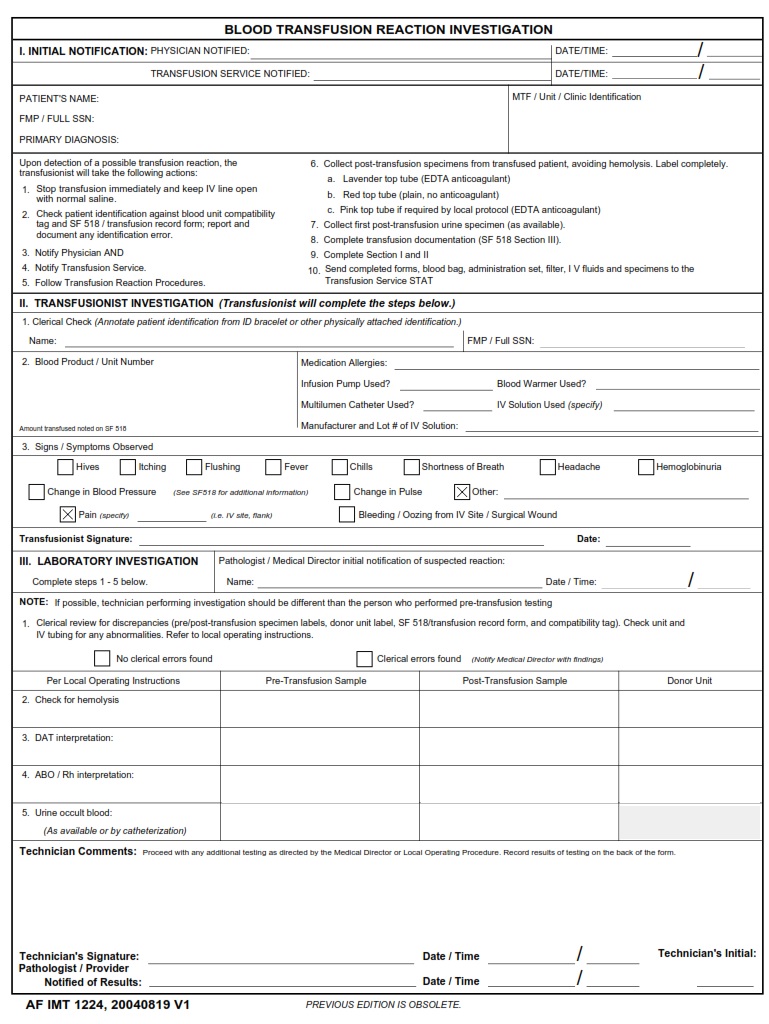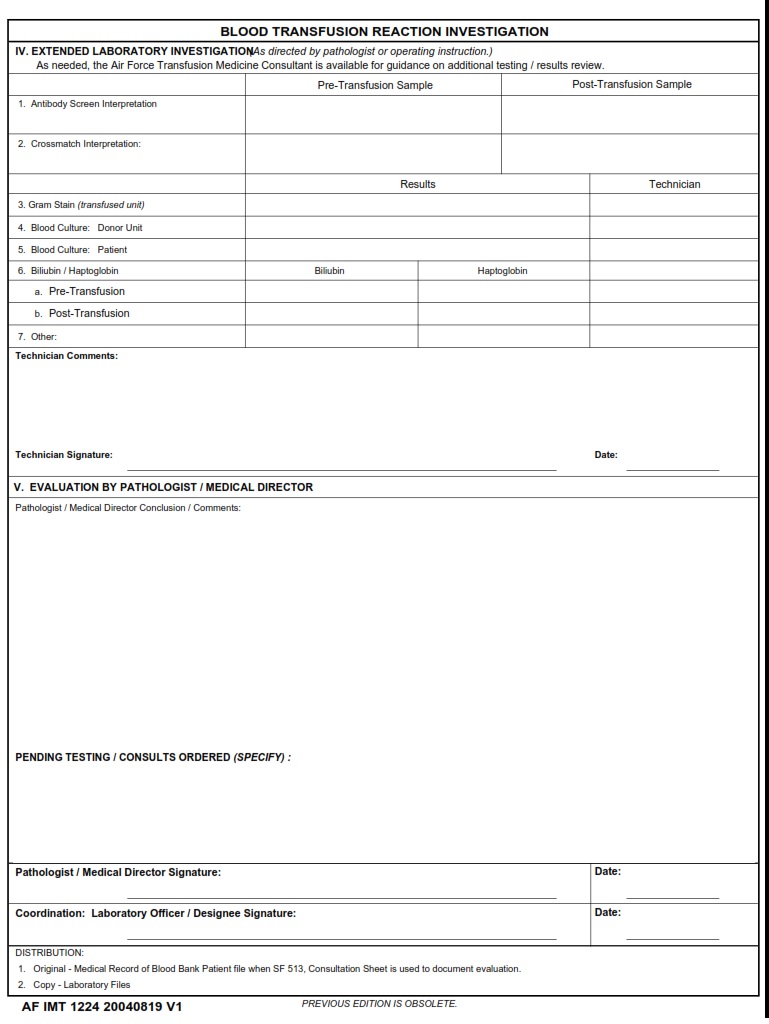AF-FORMS.COM – AF Form 1224 – Blood Transfusion Reaction Investigation – Blood transfusions are essential medical procedures that save countless lives every day. However, what happens when a lifesaving treatment becomes life-threatening itself? The AF Form 1224 – Blood Transfusion Reaction Investigation dives deep into the mysterious world of adverse reactions to blood transfusions. This groundbreaking document uncovers the hidden dangers lurking within seemingly harmless bags of donated blood, shedding light on the potentially life-altering consequences faced by patients and providing crucial insights for medical professionals.
Imagine lying in a hospital bed, weak and desperate for a lifeline. The doctor assures you that a blood transfusion will bring you back from the brink of death. But what if this last hope turns into your worst nightmare? Enter AF Form 1224 – Blood Transfusion Reaction Investigation – an eye-opening exposé that unravels the chilling reality behind unexpected complications after receiving donated blood. Brace yourself as we embark on a journey to uncover the secrets that lie beneath this life-saving procedure, revealing stories of courage, resilience, and unforeseen tragedies along the way.
Download AF Form 1224 – Blood Transfusion Reaction Investigation
| Form Number | AF Form 1224 |
| Form Title | Blood Transfusion Reaction Investigation |
| Edition Date | 8/19/2004 |
| File Size | 66 KB |
AF-Form-1224-Blood-Transfusion-Reaction-Investigation.pdf (120 downloads )
What is an AF Form 1224?
AF Form 1224, also known as the Blood Transfusion Reaction Investigation form, plays a crucial role in the medical field. Designed by the United States Air Force, this form enables healthcare providers to document and investigate any adverse reaction that occurs during or after a blood transfusion. By systematically collecting relevant information such as patient demographics, symptoms experienced, and laboratory results, AF Form 1224 supports medical teams in identifying potential causes of transfusion reactions and implementing preventative measures.
One fascinating aspect of AF Form 1224 is its contribution to continuous improvement in patient care. Through its thorough documentation process, this form helps gather data on transfusion reactions for further analysis. By examining patterns or trends from multiple cases over time, researchers can better understand the factors contributing to adverse reactions and develop strategies to mitigate them more effectively. Moreover, these investigations can also serve as valuable educational opportunities for healthcare personnel involved in blood transfusions by raising their awareness about potential risks and how to respond promptly.
In essence, AF Form 1224 underscores the commitment of medical professionals to providing safe and high-quality care for patients requiring blood transfusions. It highlights the importance of thorough investigation when adverse reactions occur to ensure timely interventions are implemented and prevent future occurrences. This form serves as both a powerful tool for documenting incidents and an essential resource for ongoing research aimed at improving transfusion practices across various healthcare settings.
Where Can I Find an AF Form 1224?
When it comes to the AF Form 1224, many individuals may find themselves wondering where they can obtain this crucial document. Luckily, acquiring an AF Form 1224 is a fairly straightforward process. One of the easiest ways to access this form is by visiting the official website of the United States Air Force. Their website provides a comprehensive list of all forms including the AF Form 1224, which can be downloaded and printed for immediate use.
Additionally, for those who have access to military installations or medical facilities on base, it is highly likely that these locations will have copies available for use. In such cases, simply inquire at the appropriate office or department within your unit or medical facility and they should be able to provide you with an AF Form 1224.
It’s important to note that while obtaining an AF Form 1224 may seem like a simple task, ensuring its accurate completion requires care and attention. This form plays a vital role in documenting blood transfusion reactions and investigating any possible adverse events that may occur during the procedure. By following the proper channels and procedures outlined above, you can ensure that you are well-prepared when faced with a blood transfusion reaction investigation situation in your professional life within the Air Force.
AF Form 1224 – Blood Transfusion Reaction Investigation
Have you ever wondered what happens behind the scenes when a blood transfusion goes wrong? The AF Form 1224 – Blood Transfusion Reaction Investigation is a vital tool in uncovering the mysteries of these potentially life-threatening situations. Whether it’s an unexpected adverse reaction or a mismatched blood type, this form serves as a comprehensive guide for medical professionals to investigate and document every aspect of the incident. In this article, we delve into the fascinating world of blood transfusion reactions and explore how the AF Form 1224 plays a crucial role in ensuring patient safety and advancing our understanding of these complex medical events.
Picture this: an emergency room buzzing with activity as doctors scramble to save a patient’s life after a blood transfusion has gone awry. It’s moments like these that highlight just how critical it is to understand and prevent adverse reactions in such delicate procedures. Enter AF Form 1224 – Blood Transfusion Reaction Investigation, the unsung hero that unravels the tangled web of what went wrong during these high-stakes scenarios. In this article, we peel back the curtain on this remarkable form and take you on a journey through its significance in investigating blood transfusion reactions, shedding light on how it promotes safer practices and better patient outcomes.

